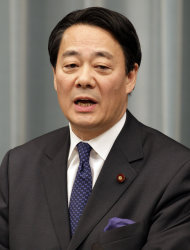A close race emerged Saturday among the men seeking to replace Prime Minister Naoto Kan and lead Japan as it emerges from its worst disaster since World War II, with five declaring their candidacy for the ruling party's top spot.
Kan announced Friday he would resign after serving nearly 15 months that have been plagued by ruling party infighting, gridlock in parliament and clamorous criticism of his administration's tepid initial reponse to the March 11 earthquake and tsunami and ensuing nuclear crisis.
A new leader is to be chosen Monday. Public opinion polls show that the favorite to replace Kan is former Foreign Minister Seiji Maehara, but Trade Minister Banri Kaieda has emerged as a strong contender said he was backed by veteran party power broker Ichiro Ozawa.
The Japanese public, yearning for political unity and resolve in the wake of the disasters, has grown disgusted with the squabbles and blame-trading that have dominated parliamentary sessions.
The five members of the ruling Democratic Party of Japan who declared their candidacies after Kan's announcement planned to hold news conferences and debates Saturday and Sunday. Then, the party's 398 members of parliament were to vote Monday to choose the new party chief, who will almost certainly become prime minister because of the party's majority in the more powerful lower house.
Kan's successor will become Japan's sixth prime minister in five years, perpetuating the high turnover in political leadership even as the country grapples with a sluggish economy, an aging population and the enormous reconstruction effort after the country's triple disaster.
So far, candidates running for party chief have spelled out little about their vision for post-tsunami reconstruction or other serious issues, such as tackling the bulging national debt. Most of them also have not taken a clear stance on the future of atomic power despite growing public worries about meltdowns at the Fukushima Dai-ichi nuclear power plant.
In the murky world of faction-dominated Japanese politics, they seem more concerned about getting votes from fellow party members and shoring up their base of support, experts say.
The party leadership race could end up as a duel between the relatively young and telegenic Maehara, the former foreign minister, and Kaieda, the economy minister, who reportedly has the backing of party stalwart Ozawa.
A China hawk, Maehara, 49, gained prominence by taking a firm stand toward Beijing during a territorial spat last year over some disputed islands in the East China Sea. He is strongly pro-Washington and supports a close security alliance with the U.S.
Other candidates in the party leadership race include Finance Minister Yoshihiko Noda, who has spent recent weeks contending with the yen's record appreciation that is hurting Japan's exporters, former Transport Minister Sumio Mabuchi and Farm Minister Michihiko Kano.
After Monday's party vote, the new Cabinet could be installed as early as Tuesday.
Kan announced Friday he would resign after serving nearly 15 months that have been plagued by ruling party infighting, gridlock in parliament and clamorous criticism of his administration's tepid initial reponse to the March 11 earthquake and tsunami and ensuing nuclear crisis.
A new leader is to be chosen Monday. Public opinion polls show that the favorite to replace Kan is former Foreign Minister Seiji Maehara, but Trade Minister Banri Kaieda has emerged as a strong contender said he was backed by veteran party power broker Ichiro Ozawa.
The Japanese public, yearning for political unity and resolve in the wake of the disasters, has grown disgusted with the squabbles and blame-trading that have dominated parliamentary sessions.
The five members of the ruling Democratic Party of Japan who declared their candidacies after Kan's announcement planned to hold news conferences and debates Saturday and Sunday. Then, the party's 398 members of parliament were to vote Monday to choose the new party chief, who will almost certainly become prime minister because of the party's majority in the more powerful lower house.
Kan's successor will become Japan's sixth prime minister in five years, perpetuating the high turnover in political leadership even as the country grapples with a sluggish economy, an aging population and the enormous reconstruction effort after the country's triple disaster.
So far, candidates running for party chief have spelled out little about their vision for post-tsunami reconstruction or other serious issues, such as tackling the bulging national debt. Most of them also have not taken a clear stance on the future of atomic power despite growing public worries about meltdowns at the Fukushima Dai-ichi nuclear power plant.
In the murky world of faction-dominated Japanese politics, they seem more concerned about getting votes from fellow party members and shoring up their base of support, experts say.
The party leadership race could end up as a duel between the relatively young and telegenic Maehara, the former foreign minister, and Kaieda, the economy minister, who reportedly has the backing of party stalwart Ozawa.
A China hawk, Maehara, 49, gained prominence by taking a firm stand toward Beijing during a territorial spat last year over some disputed islands in the East China Sea. He is strongly pro-Washington and supports a close security alliance with the U.S.
Other candidates in the party leadership race include Finance Minister Yoshihiko Noda, who has spent recent weeks contending with the yen's record appreciation that is hurting Japan's exporters, former Transport Minister Sumio Mabuchi and Farm Minister Michihiko Kano.
After Monday's party vote, the new Cabinet could be installed as early as Tuesday.
